Chaga mushrooms grow wild in the Northern Hemisphere and resemble burnt charcoal found growing on the trunks of birch trees. Due to its high level of antioxidants, chaga mushroom consumption is used to treat a variety of health ailments ranging from antiviral and antibacterial needs to anticancer. We go into depth about chaga's full range of health benefits in this blog.
To reap these antioxidant benefits, the chaga mushroom cell walls must be broken down with hot water extraction, thus unlocking the healing compounds of the mushroom.
If you combine hot water and chaga mushrooms….well, chaga tea has entered the chat.
First, a quick recap:
What is chaga tea?
Now that we’ve covered what chaga mushrooms are on a high level, you may be wondering, what is chaga tea? For thousands of years, Eastern European countries have made chaga tea as a natural way to treat cancer, various viral infections, and more. Since chaga mushrooms are so nutrient dense, it has gained popularity in the western world in the last few decades as a common way to help with overall health and wellbeing.
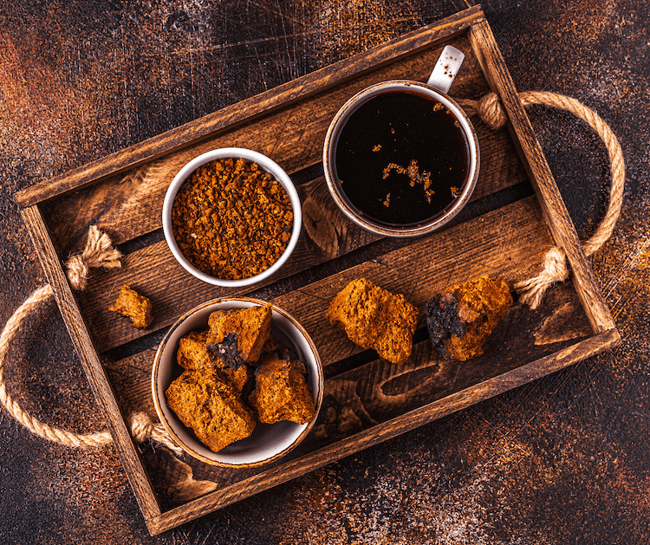
The two ways to make chaga tea:
-
By grinding down fruiting bodies and steeping the powder in hot water to create a hot tea water
-
Steeping dried chaga mushrooms fruiting bodies in hot water for a two to three hour period and then strain the fruiting bodies from the hot tea water
If you want to try making chaga tea at home, check out our step-by-step guide.
What are the beneficial compounds of chaga tea?
By making chaga tea using hot water as an extract method, the person consuming the tea will consume many nutritional compounds found in the cell walls of the mushroom, including:
- Antioxidants: melanin, the black pigment seen on the outside of chaga mushrooms contains antioxidants (e.g., polyphenols)
- Beta-D-glucans: beta-glucans found in chaga mushroom cell walls can potentially regulate your immune system and lower cholesterol and blood sugar levels
- Betulin and betulinic acid: chaga mushrooms absorb betulin and betulinic acid compounds from tree bark as they grow, which are linked to fighting cancer
- Polysaccharides: polysaccharides found in chaga chitin walls may help with healthy blood sugar level maintenance and promotion of liver, heart, and intestinal health
- Phytosterols: Last but not least, phytosterols found in chaga may help fight cancer cells and viruses
Let’s look a little further into the vitamins and minerals found in chaga tea that make it a nutritious and beneficial option for health and wellbeing.
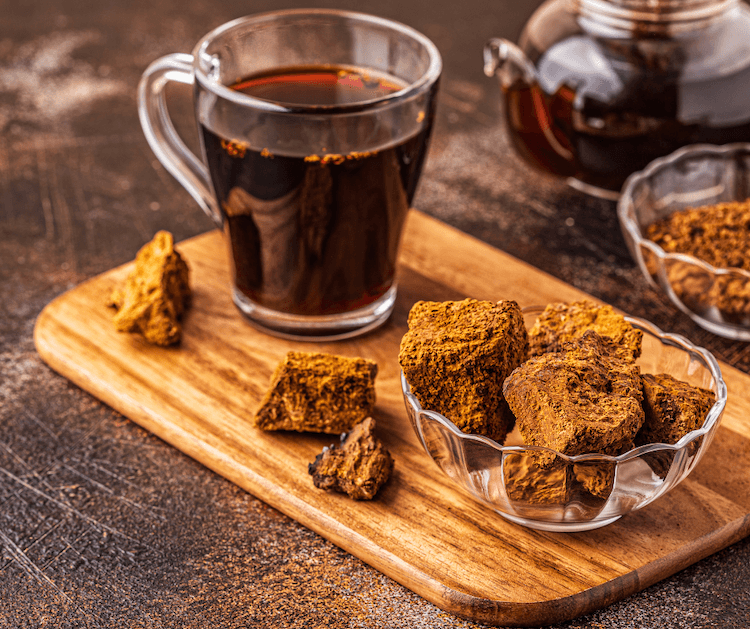
Nutritional benefits of chaga tea
Although the nutritional benefits of chaga vary by product and dose, studies on chaga mushrooms have shown the presence of:
- B-complex vitamins
- Vitamin D
- Potassium
- Rubidium
- Cesium
- Amino acids
- Fiber
- Copper
- Selenium
- Zinc
- Iron
- Manganese
- Magnesium
- Calcium
Whew, that’s a lot of nutrients! This dense nutrient makeup is what makes chaga tea such a popular option for medicinal mushroom consumption.
An important note: Chaga tea is high in oxalates that may cause kidney stones. Please consult a doctor before drinking chaga tea if this is a concern for you.Chaga tea health benefits
As noted above, the chaga mushroom species is shown to be full of antioxidants and anti-inflammatory compounds, making it a popular choice for preventative care and treatment for a variety of health needs.
Most commonly, chaga is used to help with:
- Boosting the immune system
- Fighting inflammation
- Preventing and/or fighting cancer
- Lowering blood sugar
- Addressing high cholesterol
- Preventing or treating heart disease
- Digestive assistance and constipation
- Treating insulin imbalances
- Preventing side effects of Rx drugs
- Slowing the aging process
- Tuberculosis treatment
- Tumors
To learn more about the health benefits of chaga mushroom consumption, check out our blog post on chaga mushroom health benefits. For the best mushroom supplements on the market, read our guide.
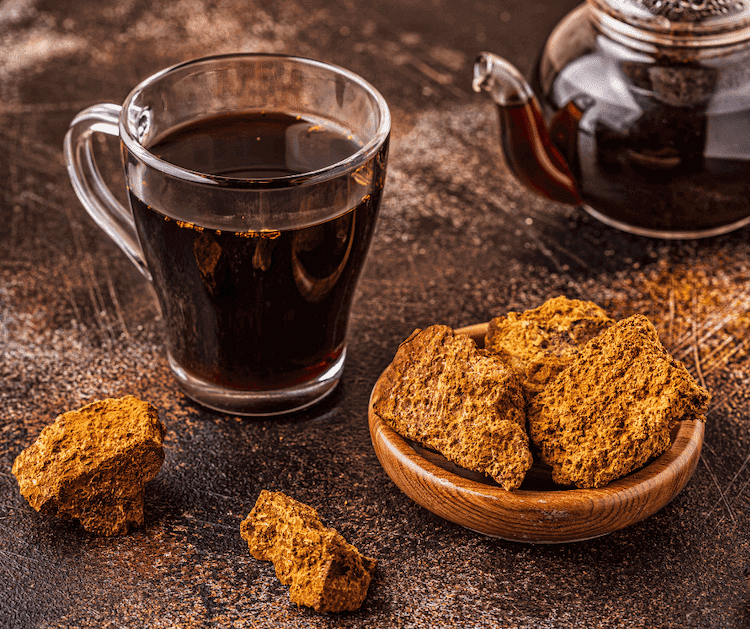
When is the best time to drink chaga tea?
Many people note that it’s safe to drink chaga tea regularly in moderate doses. Since chaga has been linked to stomach issues, if regular consumption is something you’re considering, it’s recommended to blend chaga with other beneficial herbs to regulate the dose and, in turn, be kind to your belly.
If you’re sick or are experiencing health issues, some people say increasing dosage may be beneficial to regulate your system. However, the “right” dose is ultimately different person-to-person.
What does chaga tea taste like?
Chaga tea is noted to be medium bodied with an earthy flavor, with very little traditional mushroom flavor present. Some note that chaga has a bitter aftertaste, and it can be helpful to enjoy it with some honey, maple syrup, or milk for a creamier and sweeter taste. Please see details below about our tips for making chaga.
Tips for making chaga tea
Brewing chaga tea at home is super easy to do. The key to really taking advantage of the nutritional benefits of the mushroom is to steep the chaga at 160 to 175 degrees Fahrenheit for at least four to six minutes. We have two ways to achieve this…
To make your chaga tea on the stovetop, we recommend:
- Adding four or five pieces of chaga to a pot filled with one liter of water
- Bring the water and chaga pieces to a simmer, and let it sit on low heat for two to three hours
- After the three hours is up, strain the chaga chunks from the tea water
- Serve hot and enjoy!
To make a single cup of chaga tea, we recommend:
- Break chaga mushroom into 10-gram pieces and grinding it down into a powdered substance OR purchase a pre-made chaga mushroom powder from a trusted mushroom company
- Measure out one or two teaspoonfuls of the powder in a tea infuser
- Boil water
- Pour 12 ounces of the boiling water into the cup with the tea infuser
- Steep for five minutes and enjoy!
Some people have reported the taste of chaga mushroom tea to be too harsh - if you feel this way after taking a first sip, consider adding some maple syrup, honey, or milk of choice to your cup to give it a creamier and sweeter taste.
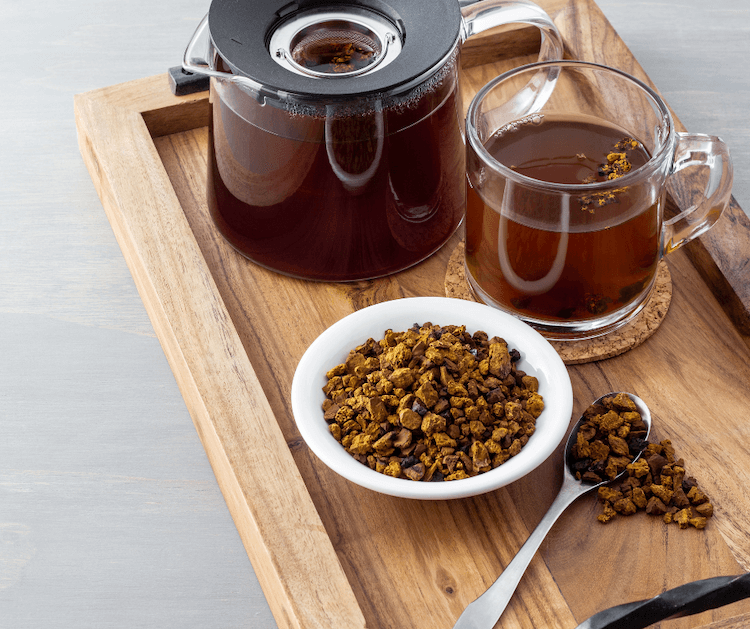
Is chaga tea safe to drink?
There have been very few cases in which chaga tea has been noted to harm the person drinking it.
However, as a popular drink for aiding the digestive system, drinking chaga tea has been linked to an upset stomach at times.
The other most common and potentially serious chaga tea side effects include:
- Bleeding
- Bruising
- Increased blood flow during a surgical procedure
- Aggravation of auto-immune diseases (e.g., Lupus, Arthritis, etc.)
- Low blood sugar
- Weakness
- Confusion
- Irritability
- Extreme thirst
- Kidney damage
Most of these side effects have been seen when chaga is consumed alongside specific medications.
Please consult a health professional if you are taking any medications noted in our chaga interactions and side effects blog post.
Thanks for dropping by to learn more about chaga tea! We hope you found this blog post helpful. Curious to learn more about chaga mushrooms or other medicinal mushrooms? Browse around our blog for more information - there’s a lot to explore.

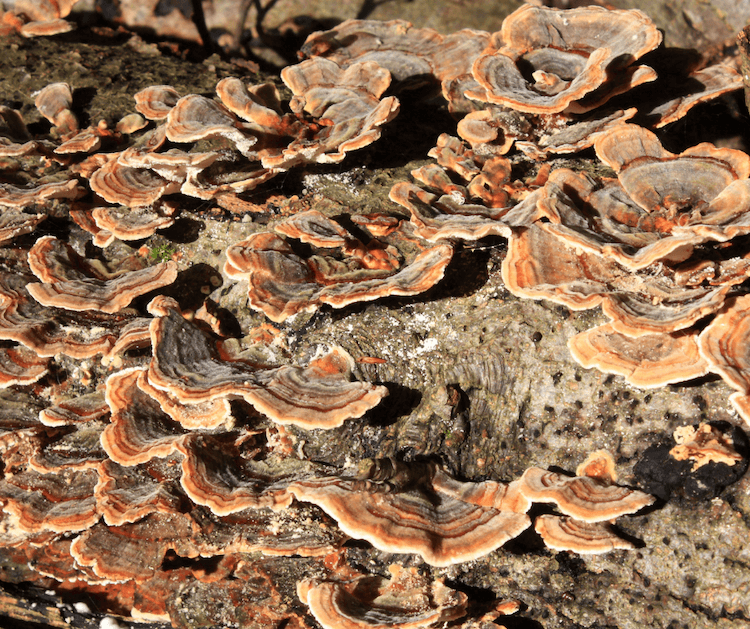
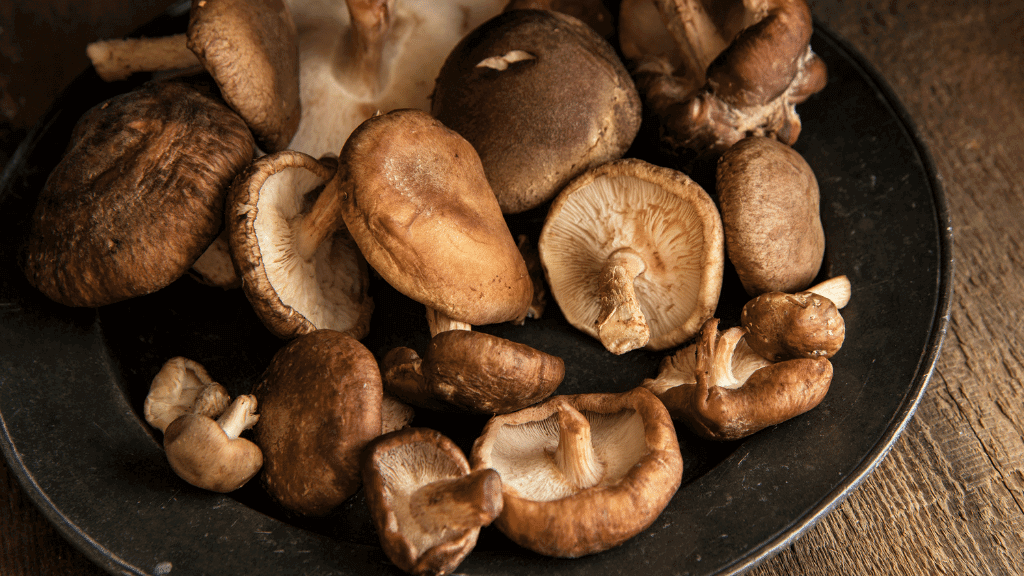


.png)
